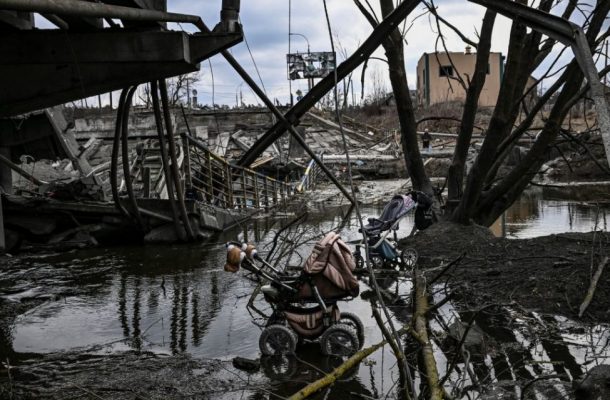A red line in Ukraine

Mariupol is Russia’s theory of victory for its invasion of Ukraine. This strategy aims to break Ukrainian resistance by turning Ukraine’s cities into charnel houses through artillery bombardment and forcing the survivors into submission through a campaign of terror.
It could work. While Russia’s troops lack the ability to decisively defeat the Ukrainian army in the field, weight of numbers may enable them to get close enough to key Ukrainian cities to repeat the Mariupol strategy on a larger scale. Ukraine cannot defend its civilians against overwhelming artillery bombardment.
The West can prevent a Russian victory through atrocity by imposing a red line of its own: a campaign of atrocities will result in direct Western intervention sufficient to ensure that Russia loses. Since Russia has no other path to victory, this red line will—if respected or enforced—force the war into a stalemate and a negotiated peace.
To be respected or enforced, this red line needs to be credible. It will be credible only if it can be enforced and as long as enforcing it when called upon to do so is sensible from a risk–return perspective.
Russia’s principal military advantage lies in its artillery, and Russian forces suffer from poor logistical support. Consequently, a Western aerial campaign that degrades Russia’s artillery and logistics would ensure that Russia cannot win. This aerial campaign wouldn’t require maintaining air supremacy over all of Ukraine all of the time (unlike a no-fly zone). It would simply require getting Western planes close enough to Russian targets to launch their strikes (which rely heavily on stand-off precision-guided munitions).
To prevent this campaign from succeeding, Russia would need to establish a no-fly zone of its own. Based upon the performance of the Russian air force and air defence network to date, trying that will get them slaughtered.
So, this ‘no atrocities’ red line could be enforced. But enforcing it would obviously involve war with Russia (to acknowledge the giant bear in the room). That being the case, would enforcing it ever actually make sense?
The principal argument against any direct Western intervention in Ukraine is that it will create the risk of a nuclear war. And since running that risk can’t possibly make sense, no Western red line in Ukraine will be credible.
If you find that argument persuasive, then I have really bad news for you. The US (along with the UK and France) doesn’t run a ‘zero risk of nuclear war’ policy. The simple fact that the US, UK and France maintain a policy of nuclear deterrence means that we are at risk of a nuclear war with Russia right now. Plausible estimates suggest that the cumulative probability of nuclear war over the next 75 years exceeds 50%.
Short of unilateral nuclear disarmament by the West, then, a ‘no risk of nuclear war’ option is just not on the table.
Instead, the West must decide whether an option is sensible by considering both its immediate effects and its marginal impact on the cumulative long-run probability of nuclear war relative to alternatives.
A ‘no atrocities’ red line will save Ukraine and could well induce Russia to honestly enter into negotiations to end the war. Of course, if Russia pursues an atrocity strategy and the West does intervene, the immediate risk of nuclear war would undoubtedly increase.
That said, Matthew Kroenig’s examination of the outcomes of 52 nuclear crises (some of which involved direct conventional clashes) in his book The logic of American nuclear strategy suggests that both sides in these crises behave rationally. And destroying the world to prevent a negotiated settlement to the Ukraine war is not a very rational choice.
However, any immediate increase in the risk of nuclear war that this red line will create must be weighed against the long-run impact on the risk of nuclear war that allowing Russia to triumph would create.
In this world, Russia will know that nuclear blackmail enabled it to win a brutal war against a country in which the West invested enormous amounts of diplomatic and political capital. The lesson that Russia and other hostile regimes will draw is that nuclear blackmail is a carte blanche to pursue revisionist policies.
A Russian victory will inevitably lead to both nuclear proliferation and brutal conquests backed by threats of nuclear war made by regimes that believe that the West will always fold in the face of such threats. The cumulative long-run risk of nuclear war in this world is far higher than in the world where the West stops Russia now.
So, while there is no risk-free option for dealing with an expansionist and tyrannical nuclear power, imposing a ‘no atrocities’ red line for Ukraine offers the best prospect of both preventing a second Holodomor and minimising the long-run risk of nuclear war.
The West should declare a ‘no atrocities’ red line now.
This article was published by The Strategist.
Kevin R. James is an economist in the Systemic Risk Centre at the London School of Economics. Follow him on Twitter at @kevinrogerjames.













